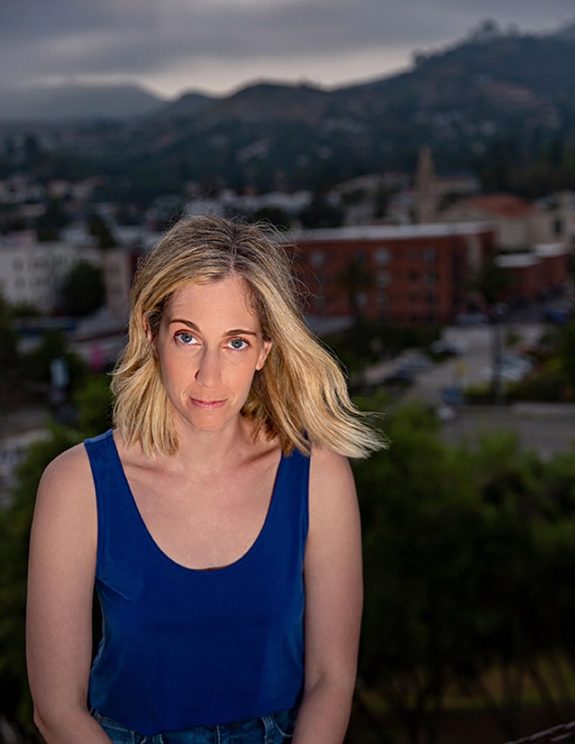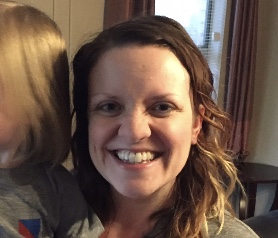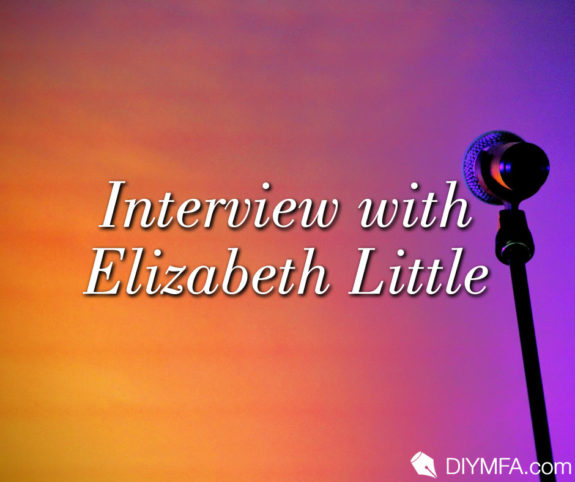In today’s #OwnVoices interview, we pivot to a type of difference near and dear to me – neurodiversity. I spoke with Elizabeth Little about her novel Pretty as a Picture, which features a main character, film editor Marissa Dahl, who is autistic. Little herself is autistic and the mother of a son with autism, as am I. We talked about the challenges and daily life of neurodivergent people, both real and fictional. Pretty as a Picture is now available in paperback.
About Elizabeth Little

Elizabeth Little is the Los Angeles Times-bestselling author of Dear Daughter and Pretty as a Picture. She won the Strand Critics Award for Best First Novel and was nominated for the Macavity, Barry, and John Creasey New Blood Dagger awards. She lives in Los Angeles with her family. elizabeth-little.com
The Interview
Sara Farmer: As a neurodivergent person with an alphabet soup of diagnoses, I found your portrayal of Marissa’s differences and coping mechanisms to be very accurate. Almost uncomfortably so at times. I felt very seen, especially with her bedtime routine and her desperate need for alone time at the end of the day. (She’s much better at calming anxiety than I am. I might have to try her methods.) Did you write from personal experience? What inspired this character?
Elizabeth Little: It’s funny, looking back, because when I was first conceptualizing this story in early 2017, the thought occurred to me, “What if Marissa is autistic?” I sat with that idea for a little while before convincing myself that, no, I wasn’t the right person for that particular story. I decided instead to write a character based very deliberately on my own experience of the world, because I so rarely saw myself in the thrillers that I read and I thought it might be a nice change.
Then, six months later, I was informed not only that my child was autistic, but that I probably was, too.
By the time I sent the manuscript to the printers, nearly two years later, I’d come to a rather more complex understanding of both Marissa and myself, but a surprising amount of that early material made it into the final draft. The prologue, for instance, was the very first thing I wrote and it barely changed throughout revisions.
When I read it now, of course, all I can think is, “How in the world was it possible I didn’t know I was autistic?”
Sara: You let the symptoms and coping mechanisms speak for themselves in the book. Marissa shows signs of anxiety, Autism Spectrum Disorder (ASD), ADHD, OCD, and Sensory Processing Disorder (SPD). Those disorders often overlap or mimic each other, as well as share symptoms with others. What was your purpose in avoiding specific clinical labels for Marissa?
Elizabeth: I had a few reasons. First and foremost, I didn’t include labels in the story, because Marissa herself doesn’t know she’s autistic. That’s fundamental to her character: She knows she’s different, somehow, but she doesn’t know why or how or what to do about it. (It’s possible I was working through some stuff.) Even though I was purposeful, deliberate, and specific in the way I depicted Marissa’s mannerisms and thought patterns—if you know anything about ASD, I think it’s reasonably obvious what I’m trying to do here—I still wanted Marissa to be something of a mystery to herself.
It was also important to me to be mindful of the limitations of my own perspective: Being diagnosed with autism as an adult does not make me an expert on the lived experience of adults who were diagnosed with autism as children. Maybe one day a character with a different diagnostic and therapeutic history will feel within responsible reach for me, but at the time I was still trying to figure out the basics. I mean, I barely knew what IDEA was until I had to start citing it! I was simply not equipped to write about anything in the neurodiversity space save my own, very specific experience.
All this said, I certainly could have used the word “autistic” on my website or in the flap copy. This is something I went back and forth on a number of times and I’m still not entirely certain I made the right choice. Ultimately, I was worried that neurotypical readers wouldn’t allow themselves to relate to Marissa if they knew from the outset that she’s autistic. I also feared that my own diagnosis would be discounted (because the internet is awful), so I told myself I had to scrape together the money for a formal assessment before saying anything publicly. And that took a while (because our healthcare system is also awful).
But now I wonder if I was worrying too much about the wrong people—admittedly, something of a weakness of mine. I definitely wish I had better signaled to other neurodivergent book-lovers that they are welcome and loved within the pages of my stories. I just couldn’t find a way that felt right. My diagnosis—this self-knowledge—is something I have been struggling my way toward since I was first sent to a psychologist at age 4. Even though I’m still unraveling all its implications, the fact alone is precious to me. An answer to a question I’ve had my whole life. And the idea of using it for publicity—even well-intentioned publicity!—left a sour taste in my mouth. (Because it was the only personal essay I could even imagine writing in conjunction with this book, I ended up not writing any release-week essays at all. I did a glib piece on the personal essay industrial complex for McSweeney’s instead.)
I’m certain the Autistic community would have been happy to help show me the way, but of course—ironically!—I’m extremely shy and nervous about reaching out to people, perpetually certain I’m doing something wrong, something offensive. It’s totally possible that if you hadn’t reached out to me, I would have continued quietly stewing about it in my office, wondering if I should just blurt out on Twitter, “MARISSA AND I ARE AUTISTIC, OK???”
Sara: Are film and editing interests of yours? Did you do a lot of research for this book?
Elizabeth: I have a long-standing interest in film—although unlike most movie buffs I’ve met, I didn’t watch what I would call an unusually wide variety of movies as a kid or teen. My viewing habits were much more limited than my factual knowledge suggests: My dad did his best to make sure I saw the classics, but otherwise I had a few favorites that I watched over and over (and over (and over)).
What set me apart, really, was my affinity for metadata. When I was very young, I would watch the Preview Channel on a loop and memorize the titles and descriptions of all the movies on premium cable. Then when I was a little older, I’d spend hours walking the aisles of Blockbuster, picking up the cases and reading the synopses and credits as I went. I built up a treasure trove of film-related information that wasn’t (and frankly still isn’t) necessarily rooted in the experience of actually *watching* those films.
Even that wasn’t enough to go on when writing a book that has so many specific details about film production and editing, so yes, I did do some additional research. I find it excruciatingly difficult to reach out to people I’m not close to—a limitation that weighed heavily on me when I was still writing nonfiction—but I happen to be married to a former filmmaker and am friends with several TV and film writers and editors. It’s safe to say I bugged them a whole lot over text while I was writing this book.
Sara: Did you receive any pushback about her character? Did anyone think she was unrealistic or unlikable?
Elizabeth: I’m really happy to report that I didn’t get any pushback at all on the likability front from my agent or editor—but my agent and editor have worked with me for a long time, so maybe I primed them for Marissa’s eccentricities. By the same token, it wouldn’t surprise me to learn that there are readers out there who didn’t take to Marissa. After all, there are certainly plenty of people who don’t take to me.
It didn’t even occur to me that someone might find her unrealistic! She is so real and dear to me that I can’t imagine it! Of course, those readers must exist, too. But I would like to think that, maybe, some bits and pieces of Marissa will stay with them such that they are able to better connect the next time they encounter a neurodivergent person or character.
Sara: “I’m doing it again. Convincing myself that I’m important – that I matter. That I might have a key role to play in what’s to come.” Marissa relates this sentiment several times in the book. She thinks that she tries to make herself the center of things and that she is bad for doing it. I identified with this so strongly. The sense that of course you’re not special, no matter how many people insist they care about you or how many things you achieve. Or you’re just going about your day and someone accuses you of being rude or showing off and completely blindsides you. Twice exceptional (having an area of disability and an area of giftedness) people get a double dose of accusations of “specialness” through needing accommodations and acceleration. Would you say Marissa’s insecurity about enjoying herself and feeling like an important part of a team stem from a history of negative feedback she internalized?
Elizabeth: Absolutely. This is something I see not just in myself, but in so many friends with disabilities. For me, it’s really about the tension between an aversion to being noticed and a deep desire to be *seen*. On the one hand, I constantly try to file down my rough edges, so people don’t notice how out of place I am: keeping track of every off-putting, exasperating preference or habit—clocking every sigh, every sneer—and then ruthlessly suppressing whatever I can because, historically speaking, “just being myself” has not been a winning strategy.
At the same time, my life’s work is a function of self-expression. Of finding ways to clearly and effectively share my best ideas, jokes, stories, and lines. So, I can’t exactly pretend I want to disappear, either.
I’m bad at feeling out the distinction between doing well and showing off. I’m just as bad at feeling out the distinction between fitting in and rolling over. Both, I think, are reflected in Marissa.
Sara: Now for my signature question – how long did it take you to write your first novel? Do you have drawer novels?
Elizabeth: My first novel came relatively quickly, all things considered! I think I wrote the first draft in about a year and then my stalwart editor rolled up her sleeves and helped me polish it in time for a comparatively speedy publication. The first draft of Pretty as a Picture took about a year and a half—once I got going, that is. I had a misfire along the way: 85,000 words of a novel so terrible it doesn’t even merit a drawer. I’m not sure I would even trust it as compost.

Sara Farmer lives in Austin, TX, with her husband, three kids, and two cats. When she’s not chasing kids and cats, she reads and writes mysteries. You can find her at www.kittymomma.com and on Twitter @avonlea79.







